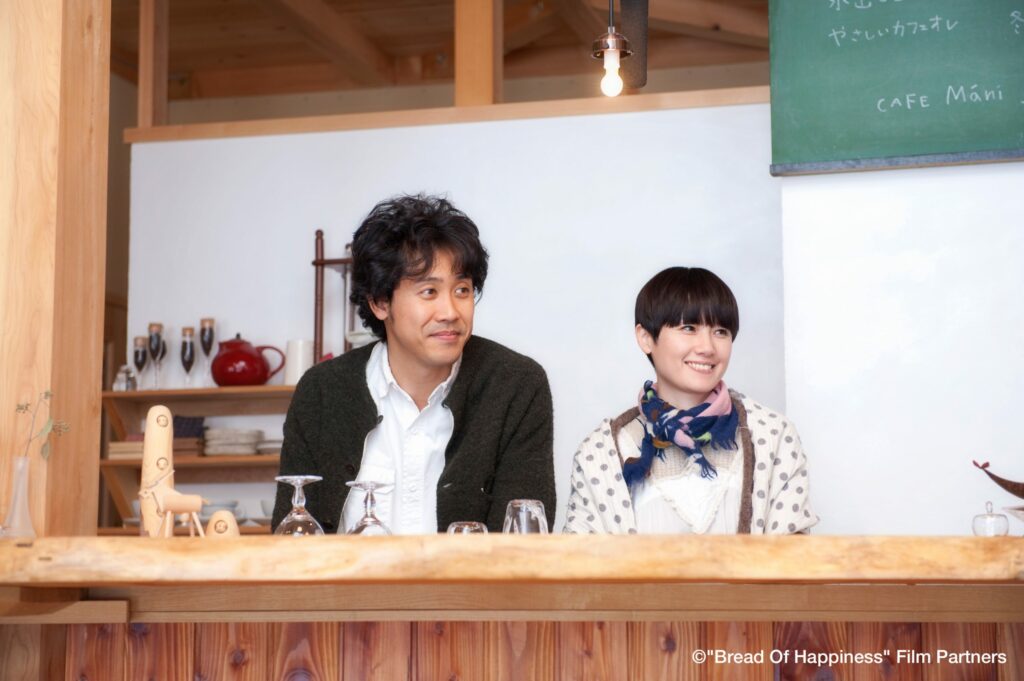I’ve said it once before: One of the best things about food is that it can become a bridge that connects us to others. Regardless of culture, location, age, or history, food shared can rarely be a negative experience.
Even food shared virtually, through a screen—specifically, through a film—could be a source of joy. In case you missed it, the Japanese Film Festival Online started last Feb. 14. With more than a dozen films in the lineup, it may be a challenge to choose which one to start your movie marathon with. But if you, like me, are a foodie, here are four films I’m sure you’ll enjoy.
“Bread of Happiness” (2012)

Like dough, we also need to rest in order to rise. If you’re in need of an escape right now, “Bread of Happiness” has that on the menu. Set in a quaint cafe in the town of Tsukiura, Hokkaido, the film is a two-hour-long highlight reel of the breathtaking seasonal views of Hokkaido interspersed with ASMR cooking and baking, and idyllic Muji life visuals.
Aesthetics aside, the film features stories of people in various life stages and the different kinds of pain they carry. Their visits to the cafe (called Cafe Mani) provide them both a physical and emotional respite, and they leave the place much happier. (I, too, came out of this film feeling lighter, to be honest!)
It brings to the forefront the idea that food, aside from nourishing the body, also holds great emotional power. The various vignettes show that food can bring people—even the most polar of opposites—together; it carries memories; and the experience of food can also be transformative.
If you like slice-of-life food dramas like Netflix’s “Midnight Diner” and “Izakaya Bottakuri,” add this to your must-try list.
“The God of Ramen” (2013)
If you love ramen, this one is a must-watch. “The God of Ramen” is a documentary that follows the man behind Tokyo’s legendary ramen shop, Taishoken.
Despite being small, cramped, and quite old, crowds of around 200 people line up to eat ramen there every day.
The documentary gives us a glimpse into the life and principles of the late Kazuo Yamagishi, the founder of Taishoken, and who may well be considered one of the pillars of the Japanese ramen industry. It maps the origin of Taishoken, and how through Yamagishi’s passion and generous mentorship, he was able to spread the technique of making delicious ramen.
Be ready to book a seat at your favorite ramen bar after watching this.
“Mio’s Cookbook” (2020)
While it is the most recent film on this list, “Mio’s Cookbook” is actually set the farthest in history, almost 200 years back to Japan’s Edo period. The two-hour period drama tells a heartwarming tale of friendship between Mio, a young girl making a name for herself as a chef, and her long-lost childhood best friend Noe, now a high-class courtesan.
The film showcases various dishes from traditional Japanese cuisine, and gives us a glimpse into the rich culinary heritage of the country as Mio strives to differentiate and marry the varying tastes of Osaka and Edo (now Tokyo).
The expert reproduction of the Edo period environment, fashion, and architecture make this a beautiful and entertaining time capsule.
“The Chef of South Polar” (2009)
It’s a little funny and ironic being “stuck indoors” and then choosing to watch a ragtag group of grown men “stuck” living together in the middle of the Antarctic, but this classic comedy and its parallels to our current situation (if you really think about it) provides some strange comfort.
After all, in “The Chef of South Polar,” the men, who are isolated from the rest of the world as they work at the research and observation base in Antarctica, find comfort and joy in food—the very thing we too have turned to for pleasure in the early months of the pandemic.
The film depicts how the men navigate their lives away from family and loved ones in the middle of the harshest cold. As the number of reported COVID cases go down and the world slowly begins to open up, the film’s moments of cabin fever, food shortage (remember early 2020’s hoarding incidents? The Great Flour Shortage? Liquor bans?), and frustration with “housemates” prompt a reflection on pandemic life so far.
At the core of it all though, is still food, and how simply and universally, “delicious meals make people happy.”
–
The Japanese Film Festival Online runs until Feb. 27.